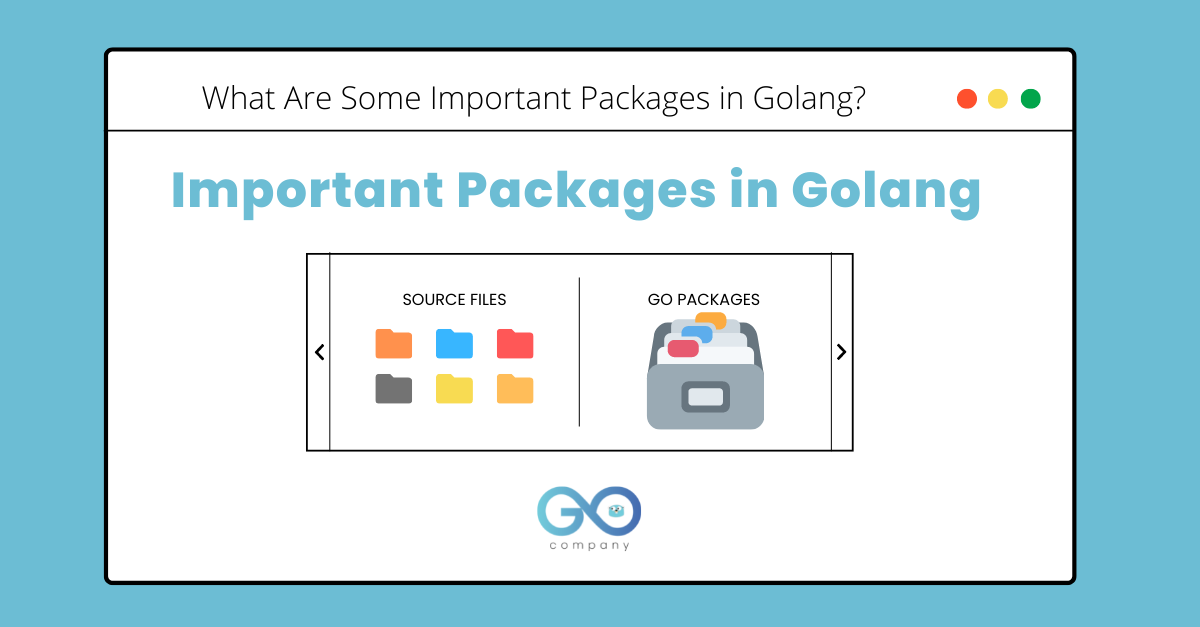What Are Some Important Packages in Golang?

Packages are an important aspect of Golang and consist of a bunch of Go source files.These files are grouped into a single unit based on similar related features. This makes them reusable, and modular. But we are not here to discuss Packages. Rather, we would have a look at some important packages in this blog that will aid us in programming.
1. Main
The package main lets the Go compiler know that it should not be compiled as a shared library. You use a package as a shared library when you deal with reusable codes. However, the main package is compiled as an executable program. It also consists of the main function, which is an entry point to the Golang program.
2. Fmt
The package fmt helps you format values, strings, etc. and print them. It also enables you to write into a file, and collect input provided by the user from the console. As you can comprehend, this package is associated with input and output formatting.
3. Log
The Golang language has a built-in logging package. It is useful for defining a type, Logger, for the formatting of output (using various methods). It consists of a predefined Logger which you can access through helper functions like Panic[f|ln], Print [f|ln] or Fata[f|ln].
4. Net/http
Any Golang developer would tell you how crucial this package is. Golang is perfect for designing web applications, i.e, HTTP servers. And this package plays an instrumental role in building these HTTP servers with the help of compositional constructs, which are quite powerful.
5. Time
The Golang standard library offers a time package. The Time package offers provisions to estimate and manipulate both “Wall clock” and “Monotonic” time. When you deal with calendrical calculations, it always assumes the Gregorian calendar, with zero leap seconds. The method time.Now() returns the current time and date, with nanosecond precision.
6. Context
Inbound requests to a particular server requires you to create a Context. On the other hand, outgoing calls to servers should accept the Context. The package context helps in defining the type of the Context. This essentially carries cancellation signals, deadlines, request-scoped values between processes and across API boundaries.
7. Gin
gin refers to a HTTP web framework that has been written in Golang. It resembles a martini-type API, but the gin framework has superior performance. Due to the presence of the httprouter, it is up to 40 times faster. So, developers prefer this framework due to the productivity factor.
8. Goose
If you are working with relational databases, then one of the main tasks is to organize schemas. In this case, the Goose packages come in handy. They enable the developers to carry out data migrations and schema changes. The migration files, which might be in the form of Go or SQL commands, help in the schema versioning.
9. Cli
This is an important and important package in Golang that allows you to develop distributable command line apps swiftly. It generates help texts, creates flags and activates Bash for the easy completion of code typing.
10. Color
Colors are used to highlight crucial messages, or errors and warnings, when you write a command-line program. In this regard, the color package comes in handy as it allows you to add shades to your program. Furthermore, it supports Windows and makes use of ANSII escape codes.
11. Now
The Now package makes it easier to work with different time and date constructs. It also provides a suitable wrapper for the standard time package. You can use this package to know the commencement of current time, add your custom formats and parse time.
Hopefully, you have some insight into the indispensable packages that you can use in Golang. As you can see, these packages simplify the workflow of the developers and makes the coding faster. So, start using packages; most importantly, use them as per your requirements.